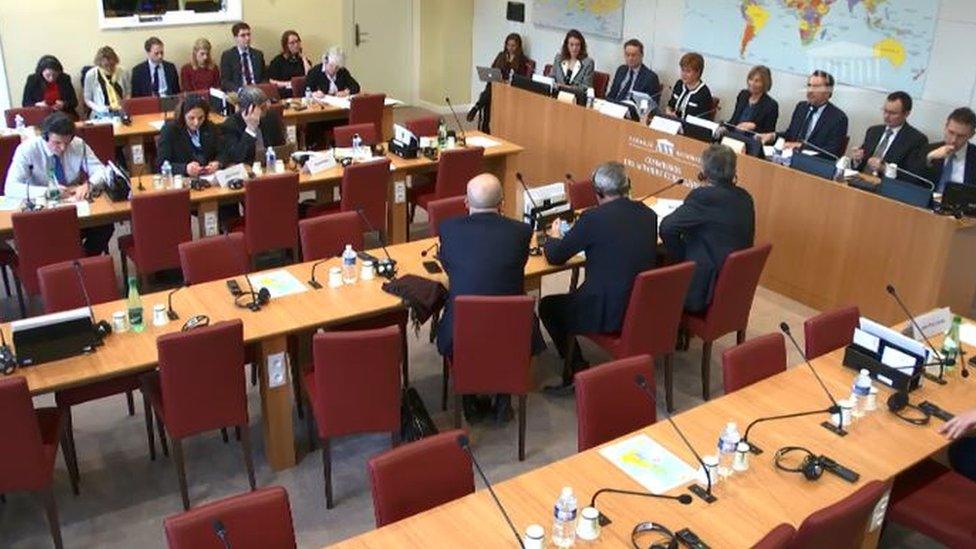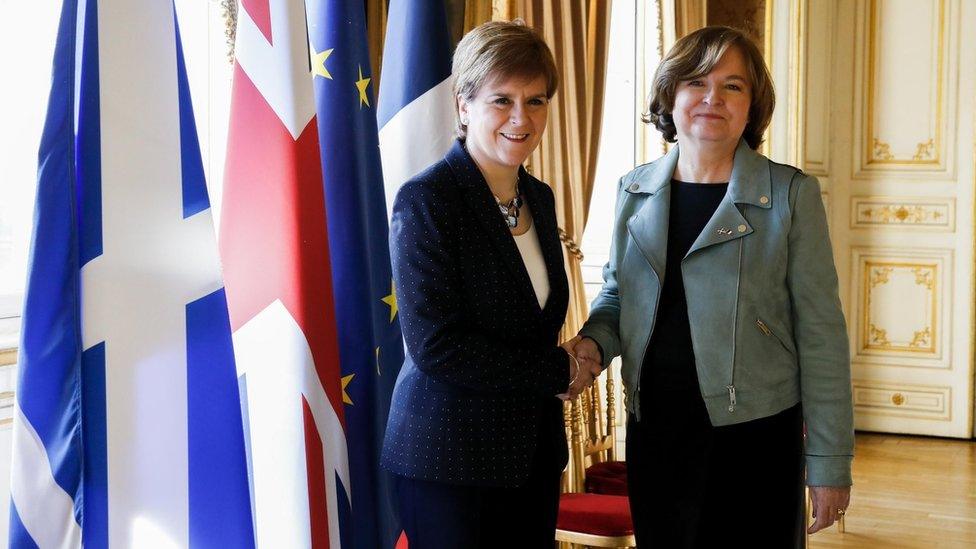Sturgeon urges EU citizens to stay in Scotland after Brexit
- Published
- comments

Nicola Sturgeon addressed a committee of the lower house of the French parliament
Efforts to encourage EU citizens to stay in Scotland after Brexit are to be stepped up, Nicola Sturgeon has told members of the French parliament.
The Scottish first minister addressed a committee of the Assemblée Nationale during a visit to Paris.
She said she would "always make it clear that EU citizens are welcome".
The Home Office is currently testing an application system for settled status in the UK, which it said 100,000 people had successfully taken part in so far.
In January, Prime Minister Theresa May announced that fees for EU nationals to apply to stay in the UK after Brexit had been scrapped - although Ms Sturgeon said this was only after lobbying from other parties.
The first minister began a two-day visit to France on Monday, with a meeting with French European Affairs minister Nathalie Loiseau.
She addressed members of the Assemblée Nationale, the lower house of the French Parliament, after opening a new Scottish government office in Paris.
Ms Sturgeon told the foreign affairs committee that her government "will always stick up for" the EU citizens living in Scotland, who include 7,000 French people.
She said: "In recent months we have lobbied successfully to ensure EU citizens would not have to pay a fee to obtain settled status in the UK. And we will always make it clear that EU citizens are welcome.
"In fact in the coming months, we plan to step up our efforts to encourage EU citizens to stay in Scotland."
Karin has spent 35 years living in Scotland but worries about signing up for Settled Status
Under current legislation, the UK is due to leave the EU on 29 March, whether an exit deal is agreed or not.
In January, Mrs May told MPs that her government was "committed to ensuring that EU citizens in the UK will be able to stay and continue to access in-country benefits and services on broadly the same terms as now, in both a deal and a no-deal scenario".
The Home Office is currently developing the system for EU citizens to get "settled status", allowing them to continue to live and work in the UK after Brexit.
This is due to be fully open by 30 March, but officials said 100,000 people had already successfully taken part voluntarily during the pilot phase of the system.
A spokeswoman said the department had "invested heavily" in the scheme, with a dedicated mobile app developed and 1,500 caseworkers recruited.


Nicola Sturgeon met French European Affairs minister Nathalie Loiseau on the first day of her visit to Paris
Analysis by BBC Scotland chief political correspondent Glenn Campbell, in Paris
Scotland's international reach is expanding, especially in Europe.
Since the EU referendum the Scottish government has opened new trade and investment hubs in Berlin and Paris. These are in addition to offices in London, Brussels and Dublin.
Since 2016, the devolved administration has increased its staff working on international affairs from 80 to 114.
It has had over 400 engagements with European governments, EU institutions and other international bodies in Europe.
Opposition parties accuse the first minister of straying into areas of responsibility reserved to the UK and spending too much time away from Scotland.
Nicola Sturgeon describes that as the worst "parochialism" and insists that with Brexit just over 5 weeks away it has never been more vital to promote Scotland internationally.